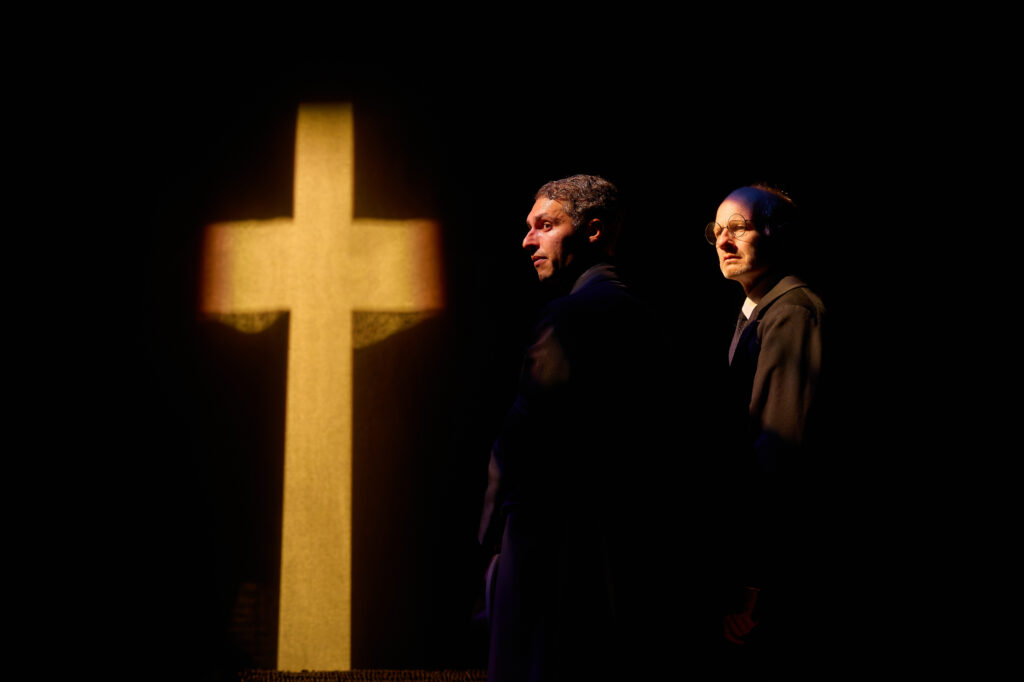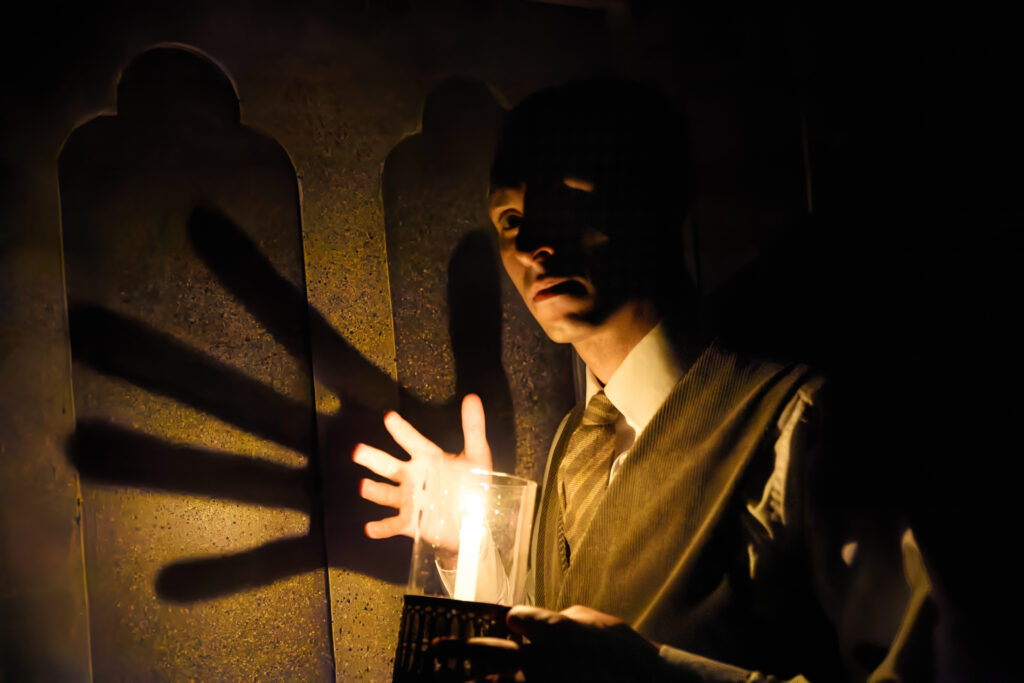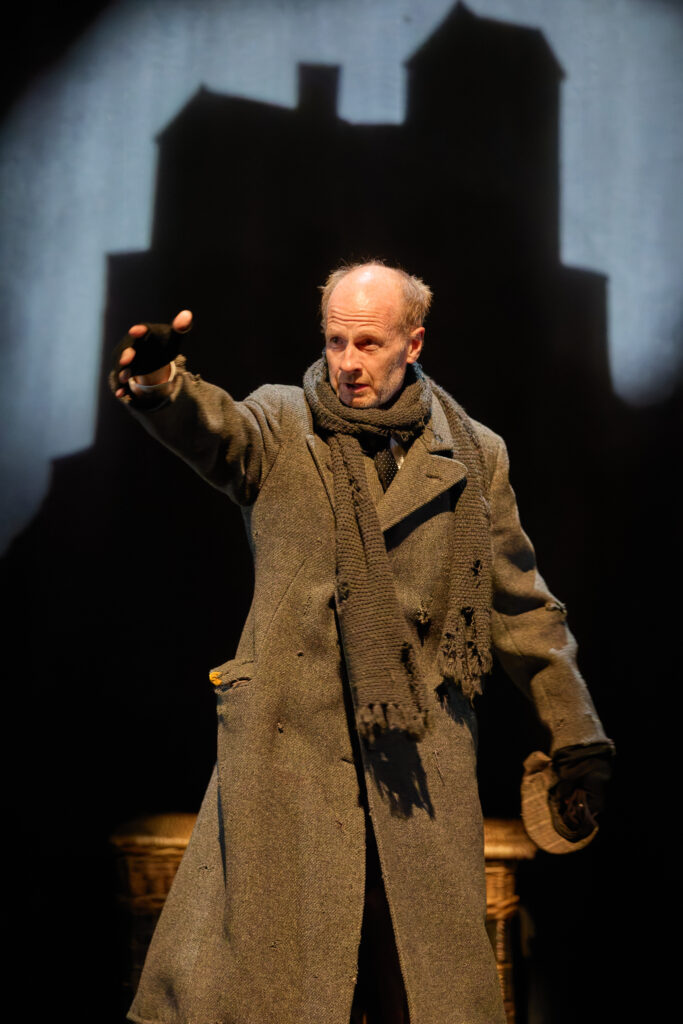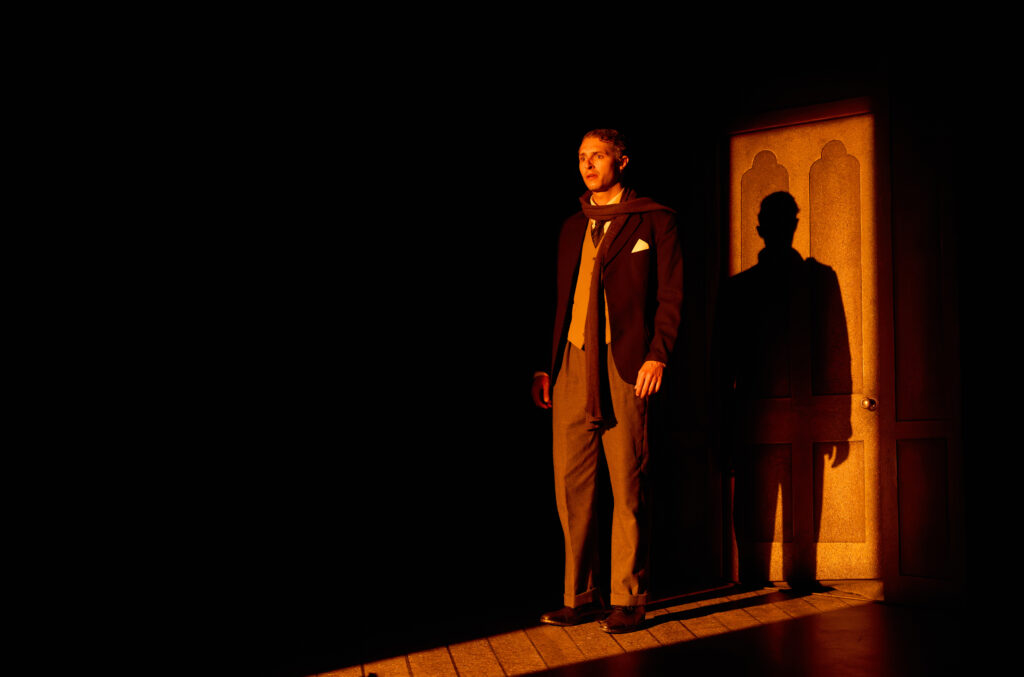The classic stage adaptation of Susan Hill’s iconic ghost story The Woman in Black has returned to Theatre Royal Brighton for a short but electrifying run—and it proves once again why this theatrical chiller has gripped audiences for more than three decades. Starring John Mackay as Arthur Kipps and Daniel Burke as The Actor, the two-man cast commands the stage with a gripping, finely tuned performance that transports the audience straight into the mist-shrouded marshes of Victorian England. The only other presence is, of course, the elusive Woman in Black herself, whose sudden appearances still succeed in making the entire auditorium recoil in fright.
Directed by Robin Herford with designs by Michael Holt and lighting by Kevin Sleep, the captivating production has cliffhanger moments and scenes that make the audience jump out of their seats. A lot is left to the imagination and scenarios are created with clever use of lighting and sound design.
Stephen Mallatratt’s masterful adaptation of Hill’s best-selling novel hinges on atmosphere, imagination, and the uncanny blurring of reality and performance. The story follows Kipps, a lawyer consumed by a curse he believes has been cast upon his family by the ghostly Woman in Black. In an effort to purge the terror that has shadowed his life, he hires a young actor to help him retell the ordeal. What begins as a simple rehearsal deepens into a chilling recreation of Kipps’s past, where the “play” they are constructing dissolves into something far more sinister.

This production also recalls the rich lineage of horror tales that have shaped the genre. The tense, hostile atmosphere in the remote village of Crythin Gifford echoes the unnerving scene in An American Werewolf in London when a lone traveller steps into a country pub filled with suspicious locals. Likewise, its shadowy corridors, oppressive dread, and unstoppable supernatural presence pay homage to classic Gothic horror, particularly Bram Stoker’s Dracula, with its sense of an ancient evil lurking just beyond the threshold.
The choice of venue elevates the experience. Brighton’s 19th-century Theatre Royal—creaking, ornate, and steeped in history—proves the ideal setting for a Victorian ghost story set largely within an abandoned theatre. The production cleverly uses this meta-theatrical framing to its advantage, drawing the audience into the illusion until the line between storytelling and haunting feels dangerously thin.

The tale unfolds as Kipps travels to the remote village of Crythin Gifford to settle the estate of the recently deceased Mrs. Drablow. At her funeral, he alone notices a gaunt young woman dressed entirely in black—an encounter that chills both Kipps and the audience as Mr. Jerome, his companion, reacts with visceral dread at the mere mention of her presence. The foreboding deepens when Kipps arrives at Eel Marsh House, reachable only by a causeway exposed at low tide. As he rifles through Mrs. Drablow’s papers, the Woman in Black appears again and again, each time tightening the grip of fear and mystery.
John Mackay does an amazing job of switching between multiple roles, playing not only Arthur Kipps, but also the horse and cart driver, a stranger on a train, and the only other guest at the funeral of Mrs. Drablow.

The production thrives on restraint and suggestion. Mallatratt’s script requires the audience to become collaborators, filling in shadows and horrors that are never fully shown. Sound, light, and minimal props combine to create a deeply unsettling atmosphere—proof that the imagination remains the most powerful special effect in theatre.
Long celebrated as one of the West End’s enduring hits, The Woman in Black closed in London in 2023 after an extraordinary 33-year run and more than 13,000 performances. It has terrified over eight million people worldwide, and its continued touring ensures that new generations can experience its brand of traditional, spine-tingling storytelling. Admirably, the production maintains its commitment to accessible pricing, ensuring students and younger theatregoers can afford to be frightened out of their seats.
At Theatre Royal Brighton, The Woman in Black feels as potent as ever—an expertly crafted, atmospheric ghost story that lingers long after the final blackout. Whether you’re a longtime fan or a first-time visitor to Eel Marsh House, this haunting classic remains a must-see for lovers of supernatural theatre and Victorian suspense.

John Mackay’s West End credits include The Doctor at the Duke of York’s Theatre, which he also appeared in at the Park Avenue Armory in New York. His other theatre credits include Witness for the Prosecution at County Hall, Home at Chichester Festival Theatre, Richard II, Machinal and Oresteia at the Almeida Theatre, Occupational Hazards, Wild, Drawing the Line, and 55 Days at Hampstead Theatre, The Sewing Group at the Royal Court, Measure for Measure and Going Dark at the Young Vic and many productions for the Royal Shakespeare Company including The Histories, Antony and Cleopatra, King Lear, The Winter’s Tale, Julius Caesar, Twelfth Night, As You Like It, Hamlet and Macbeth.
Daniel Burke’s theatre credits include the UK Tour of The Girl on the Train, Troilus and Cressida for the Royal Shakespeare Company, and Imperium Part I and Part II, also for the Royal Shakespeare Company, and at the Gielgud Theatre in the West End. His other theatre credits include Bang Bang at the Exeter Northcutt Theatre and on a UK Tour, Romeo and Juliet and Richard III at the Shakespeare Rose Theatre, Hamlet, Richard II and Romeo and Juliet for the Guildford Shakespeare Company, Comedy of Errors at the Mercury Theatre, Colchester, Love All at Jermyn Street Theatre, A Midsummer Night’s Dream and The Great Gatsby at Storyhouse’s Grosvenor Park Open Air Theatre, and The Circle at Theatre Royal Bath and on a UK Tour. His television credits include The Witcher for Netflix and Lord of the Rings Rings of Power for Amazon Prime.
It will play Theatre Royal Brighton from Tue 18 Nov – Sat 22 Nov 2025. Tickets are available via ATGtickets.com/Brighton.
The Woman in Black runs at Theatre Royal Brighton until Saturday 22nd November.



